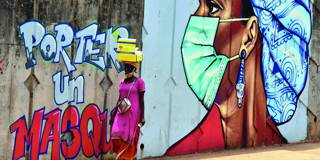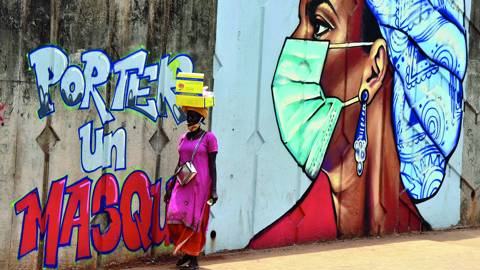By demonstrating that rapid, systemic change is possible, the COVID-19 pandemic has created an impetus for African governments to follow through on long-needed public-sector reforms. Only with improved governance and new thinking can the continent tap the massive latent potential of its population.
CONAKRY – Despite various perceived disadvantages, Africa has not been the disaster zone many feared it would be during the COVID-19 pandemic. The continent had certain natural advantages, such as a young population that is relatively less vulnerable to the virus. And owing to their experience with previous outbreaks, such as Ebola in 2014-16, many African governments were quick to act, locking down populations and closing borders to limit transmission.
The greater challenge has been economic, with many forecasters warning that the pandemic has increased extreme poverty and caused long-lasting social and economic damage in many countries. To meet these challenges – and to defy dire forecasts – African governments need to seize the unparalleled opportunity for public-sector reform that the crisis of the past two years has created.
The pandemic gave rise to practices that would have seemed impossible before, such as widespread remote work and education, and spurred new methods of health-care delivery and the unprecedently rapid development of vaccines. Suddenly, promising possibilities became new realities across Africa. Now, the same thing needs to happen to governance processes.
Streamlining governance must be Africa’s new rule. Rigid, unresponsive, and corrupt public sectors have blocked our continent’s growth and progress for long enough. The pandemic showed that systemic transformations are possible. African countries must focus on making public services more responsive, transparent, and competent. They must do more to unleash the potential within their populations, tapping into women’s labor and talent and harnessing the spirit of entrepreneurship, especially in the informal sector. And they must capitalize on the region’s abundant renewable-energy sources.
This new opportunity for a public-sector transformation reflects three recent developments. First, African countries were already improving their digital performance and engagement, and it appears that the pandemic accelerated this trend in some countries. The United Nations’ E-Government Development Index showed that between 2018 and 2020 – which included the first nine months of the pandemic – the average score for an African government increased from 0.34 to 0.4. Thirteen African countries ascended to a higher rank in the index, and 11 reported that they had introduced rapid responses to the pandemic, such as information-sharing portals and virus-tracking platforms.
For example, the Western Cape government in South Africa established an online platform to strengthen remote teaching and learning practices. Burkina Faso’s government co-organized a hackathon to generate ideas to respond to the challenges presented by COVID-19. In my own country, Guinea, the government completed its e-tax system, allowing all firms to file and pay their taxes online. And in Rwanda, robots were used to boost testing capacity in medical facilities, and drones were deployed to deliver personal protective equipment and other crucial supplies to health centers.
It took a major health crisis to make these changes happen. When I was Guinea’s minister of finance from 2016 to 2018, I pushed hard for government operations and services to be digitized; but, like ministers in other countries, I faced resistance. The reluctance to digitize can generally be explained by a mix of inertia and corruption. Because digitization makes government processes more transparent, it severely limits the scope for manipulating or burying paperwork and demanding bribes. That some public officials resist it attests to why it is a key factor in improving the performance of the public sector.
The second recent development is that the pandemic has left the public and private sectors more reliant on each other than ever before. Businesses realized that in times of crisis, private and public interests are closely connected. Though they are competitive by nature, firms saw that cooperation could be a good thing, and that governments’ ability to convene stakeholders from different sectors can yield the kind of positive-sum outcomes that one rarely sees in the private sector.
At the same time, governments realized that the private sector could help them achieve their goals, particularly in health, communications, and other sectors that were critical to the pandemic response. In Uganda, the government worked with mobile operators to make services more affordable for consumers. In Guinea, we helped connect young technology developers with funding for an app that improved COVID-19 contact tracing. And at the regional level, four African mobile network operators teamed up with 36 African governments to launch the Africa Communication and Information Platform, a mobile tool offering public-health advice to more than 600 million users.
The third development was that the informal sector proved more resilient and adaptable than many had expected. When the crisis became acute, informal economies shrank dramatically, and many types of economic activity stopped altogether. But these sectors also innovated. In Guinea, a semi-formal firm that previously specialized in repairing cell phones significantly increased its income by switching to mask production, generating jobs and income in the process. Similar examples can be found up and down the continent.
More recently, Russia’s war in Ukraine has presented new challenges, chiefly by disrupting supply chains for wheat flour, oil and gas, and other critical commodities. Nonetheless, Africa’s informal sector has remained adaptable, with bread-makers in Douala, Cameroon, using flour from local sources – plantain, cassava, and sweet potato – to compensate for the shortage of wheat.
Civil servants, politicians, and many experts have gotten the informal sector all wrong, applying a top-down approach that fails to consider what the sector needs. Given that the sector accounts for 80% of employment in Africa, informal operators should be telling policymakers what they need, rather than being told what’s good for them. Governments need to think rigorously about how to harness the sector’s resilience and creativity, rather than viewing it as a problem to be managed with social programs.
More broadly, African leaders must figure out how to transform their public sectors so that they can unleash the latent potential within their populations. Only then can the public sector, long an obstacle to growth and progress in Africa, start to claim its place as an enabler of the continent’s rise.






CONAKRY – Despite various perceived disadvantages, Africa has not been the disaster zone many feared it would be during the COVID-19 pandemic. The continent had certain natural advantages, such as a young population that is relatively less vulnerable to the virus. And owing to their experience with previous outbreaks, such as Ebola in 2014-16, many African governments were quick to act, locking down populations and closing borders to limit transmission.
The greater challenge has been economic, with many forecasters warning that the pandemic has increased extreme poverty and caused long-lasting social and economic damage in many countries. To meet these challenges – and to defy dire forecasts – African governments need to seize the unparalleled opportunity for public-sector reform that the crisis of the past two years has created.
The pandemic gave rise to practices that would have seemed impossible before, such as widespread remote work and education, and spurred new methods of health-care delivery and the unprecedently rapid development of vaccines. Suddenly, promising possibilities became new realities across Africa. Now, the same thing needs to happen to governance processes.
Streamlining governance must be Africa’s new rule. Rigid, unresponsive, and corrupt public sectors have blocked our continent’s growth and progress for long enough. The pandemic showed that systemic transformations are possible. African countries must focus on making public services more responsive, transparent, and competent. They must do more to unleash the potential within their populations, tapping into women’s labor and talent and harnessing the spirit of entrepreneurship, especially in the informal sector. And they must capitalize on the region’s abundant renewable-energy sources.
This new opportunity for a public-sector transformation reflects three recent developments. First, African countries were already improving their digital performance and engagement, and it appears that the pandemic accelerated this trend in some countries. The United Nations’ E-Government Development Index showed that between 2018 and 2020 – which included the first nine months of the pandemic – the average score for an African government increased from 0.34 to 0.4. Thirteen African countries ascended to a higher rank in the index, and 11 reported that they had introduced rapid responses to the pandemic, such as information-sharing portals and virus-tracking platforms.
For example, the Western Cape government in South Africa established an online platform to strengthen remote teaching and learning practices. Burkina Faso’s government co-organized a hackathon to generate ideas to respond to the challenges presented by COVID-19. In my own country, Guinea, the government completed its e-tax system, allowing all firms to file and pay their taxes online. And in Rwanda, robots were used to boost testing capacity in medical facilities, and drones were deployed to deliver personal protective equipment and other crucial supplies to health centers.
SPRING SALE: Save 40% on all new Digital or Digital Plus subscriptions
Subscribe now to gain greater access to Project Syndicate – including every commentary and our entire On Point suite of subscriber-exclusive content – starting at just $49.99.
Subscribe Now
It took a major health crisis to make these changes happen. When I was Guinea’s minister of finance from 2016 to 2018, I pushed hard for government operations and services to be digitized; but, like ministers in other countries, I faced resistance. The reluctance to digitize can generally be explained by a mix of inertia and corruption. Because digitization makes government processes more transparent, it severely limits the scope for manipulating or burying paperwork and demanding bribes. That some public officials resist it attests to why it is a key factor in improving the performance of the public sector.
The second recent development is that the pandemic has left the public and private sectors more reliant on each other than ever before. Businesses realized that in times of crisis, private and public interests are closely connected. Though they are competitive by nature, firms saw that cooperation could be a good thing, and that governments’ ability to convene stakeholders from different sectors can yield the kind of positive-sum outcomes that one rarely sees in the private sector.
At the same time, governments realized that the private sector could help them achieve their goals, particularly in health, communications, and other sectors that were critical to the pandemic response. In Uganda, the government worked with mobile operators to make services more affordable for consumers. In Guinea, we helped connect young technology developers with funding for an app that improved COVID-19 contact tracing. And at the regional level, four African mobile network operators teamed up with 36 African governments to launch the Africa Communication and Information Platform, a mobile tool offering public-health advice to more than 600 million users.
The third development was that the informal sector proved more resilient and adaptable than many had expected. When the crisis became acute, informal economies shrank dramatically, and many types of economic activity stopped altogether. But these sectors also innovated. In Guinea, a semi-formal firm that previously specialized in repairing cell phones significantly increased its income by switching to mask production, generating jobs and income in the process. Similar examples can be found up and down the continent.
More recently, Russia’s war in Ukraine has presented new challenges, chiefly by disrupting supply chains for wheat flour, oil and gas, and other critical commodities. Nonetheless, Africa’s informal sector has remained adaptable, with bread-makers in Douala, Cameroon, using flour from local sources – plantain, cassava, and sweet potato – to compensate for the shortage of wheat.
Civil servants, politicians, and many experts have gotten the informal sector all wrong, applying a top-down approach that fails to consider what the sector needs. Given that the sector accounts for 80% of employment in Africa, informal operators should be telling policymakers what they need, rather than being told what’s good for them. Governments need to think rigorously about how to harness the sector’s resilience and creativity, rather than viewing it as a problem to be managed with social programs.
More broadly, African leaders must figure out how to transform their public sectors so that they can unleash the latent potential within their populations. Only then can the public sector, long an obstacle to growth and progress in Africa, start to claim its place as an enabler of the continent’s rise.